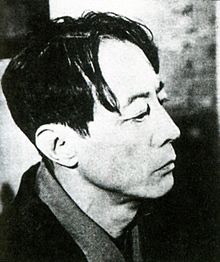Sakutaro Hagiwara
| Sakutarō Hagiwara | |
|---|---|

Sakutarō Hagiwara
|
|
| Born |
1 November 1886 Maebashi, Gumma, Japan |
| Died | 11 May 1942 (aged 55) Tokyo, Japan |
| Occupation | Writer and poet |
| Genre | poetry, literary criticism |
Sakutarō Hagiwara (萩原 朔太郎 Hagiwara Sakutarō?, 1 November 1886 – 11 May 1942) was a Japanese writer of free-style verse, active in the Taishō and early Shōwa periods of Japan. He liberated Japanese free verse from the grip of traditional rules, and he is considered the “father of modern colloquial poetry in Japan”. He published many volumes of essays, literary and cultural criticism, and aphorisms over his long career. His unique style of verse expressed his doubts about existence, and his fears, ennui, and anger through the use of dark images and unambiguous wording.
Hagiwara Sakutarō was born in Maebashi, Gunma Prefecture as the son of a prosperous local physician. He was interested in poetry, especially in the tanka format, from an early age, and started to write poetry much against his parents' wishes, drawing on the works of Akiko Yosano for inspiration. From his early teens, he started to contribute poems to literary magazines and had his tanka verse published in the literary journals Bunkō, Shinsei and Myōjō.
His mother bought him his first mandolin in the summer of 1903. After spending a futile five semesters as a freshman at two national universities, he dropped out of school, living for a period in Okayama and Kumamoto. In 1911, when his father was still trying to get him to enter college again, he began studying the mandolin in Tokyo, with the thought of becoming a professional musician. He later established a mandolin orchestra in his hometown Maebashi. His bohemian lifestyle was criticized by his childhood colleagues, and some of his early poems include spiteful remarks about his native Maebashi.
...
Wikipedia
